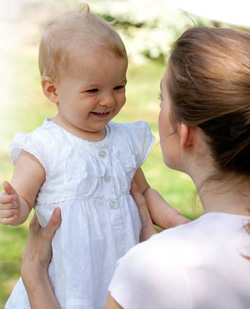Parenting Approaches

There are no hard-and-fast rules when it comes to good parenting practice. Your own approach to parenting will emerge in time.
Before you had your baby you may have had some fixed ideas about the right and wrong ways to bring up a baby. The reality is that as you settle into your new role, some of the ideas about parenting you thought were non-negotiable suddenly become less important, while others move up the agenda. Beyond the fundamental requirements to love, nurture, respond to, feed, and clothe your baby, there is so much to learn as you go along. It is essential to talk to your partner about how you will raise your baby and how, in the years to come, you will set expectations for behaviour.
One thing is certain—as your baby becomes a toddler, he will soon learn if one of you is a soft touch and one the disciplinarian, and whether or not he can play one of you off against the other. Presenting a united front and giving a clear, consistent message is the key to success, whatever approach to parenting you decide to take.
Reflecting You
Your approach to parenting will inevitably, in part, reflect the ways in which your parents brought you up. In addition, it will demonstrate your own culture and values, and your faith if you have one. It will also reflect your personality: if you tend to be laid back, it’s more likely that your parenting style will be laid back; if you are a list-maker and organizer, the chances are that your approach will be more routine based. No approach is definitive, but you need to be comfortable with the one you choose, so that you can stick by it and provide a secure environment in which your baby can develop.
Setting Boundaries
A newborn baby does not yet have the mental acuity to understand right from wrong, yes from no, good from bad. But in only a matter of months, he will begin to explore the world by such actions as reaching and grabbing, at which point, gently setting him boundaries gives him the opportunity to discover what’s around him, but also keeps him safe.
Introducing Discipline
During your baby’s first year, there are very few reasons for saying “No.” You cannot teach a baby to control his behavior at this age because he is unable to do so—the part of his brain that controls social understanding and behavior won’t be fully developed for another year or two. So “discipline” at this stage
should be about gentle correction or distraction, and saying “No” only when your baby is doing something that is unsafe for him, or for others.
Whatever boundaries you set, it is important to follow the same pattern of correction each time. One useful approach is “repeat, remove, distract.” So, you repeat the boundary (for example, “Don’t touch the vase, it may break”), then remove the temptation (put the vase away) or remove your baby from the danger, if relevant, and then distract him quickly. The next time he does the same thing, respond with the same sequence: repeat, remove, distract. Through the consistency of your words and actions, from about nine months, your baby should begin to associate certain commands with certain consequences. This is a vital lesson for the toddler years when all children learn to push boundaries, as he will trust that you mean what you say.
Giving Reasons
When you ask your baby not to do something, let him know why in very simple terms: “Don’t touch the oven—it’s hot, ouch,” and mime touching something hot. He won’t fully understand, but he’ll begin to get the idea during his first year. Getting upset with your baby won’t achieve anything. As he matures, he will listen and respond more readily when you are calm. Get his attention, speak clearly, and show him by acting it out yourself.
ASK A… CHILD PSYCHOLOGIST
When does parenting become “pushy” as opposed to “encouraging”? We live in a competitive world and there is a growing trend for parents to fill their children’s—even their babies’—time with activities to race them through developmental milestones. However, children will rarely be hurried. Encouraging your child to learn means giving him time to explore the world himself, and giving him a degree of autonomy to discover what is around him and to discover the principles of cause and effect (whether that’s in actions,
language, or sounds). It also means giving him lots of praise when he makes a new discovery, behaves well, or learns to do something for himself. Above all, children learn best through play, when they are happy, relaxed, and able to work at their own pace. If you allow lots of playtime, and read stories and sing songs together, your baby will have all the encouragement he needs to develop his mental acuity at a perfect pace, without being pushed to go too fast.
CHECKLIST
Positive Parenting
Whatever your values and the specifics of the way in which you want to raise your baby, there are certain fundamentals of parenting that will make your approach more effective and loving, and some methods that are best avoided. Positive parenting is about championing the good in your child. Children thrive on praise, and they also love attention. If they get lots of praise and attention for good behavior, but find that bad behavior is reprimanded or ignored, they soon learn to focus on the good.
Key Positive Parenting Traits
■ Give lots of extra praise and attention when your baby does as he is asked.
■ Show how proud you are of your baby. Even minor achievements can be celebrated with clapping and cheering. Your baby will love this and soon want to elicit those reactions again.
■ Show respect to your baby.
■ Be consistent in your rules or expectations and follow through with rewards for positive behaviour.
■ Show your baby you love him by giving him your undivided attention and lots of physical affection.
Parenting Traits to Avoid
■ Even if you feel frustrated, try not to react angrily toward your baby. If you stay calm, your baby will stay calm and be far more likely to respond positively to you.
■ It is never appropriate to criticize your baby. As he gets older, focus on behavior (“You did not share your toy”), not him (“You are selfish”).
■ Stick to your rules and routines: your baby will feel more secure when he knows what’s expected.
Excerpted from Baby Day by Day – Canadian Edition. Copyright 2016 Dorling Kindersley Ltd.



